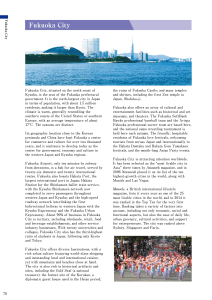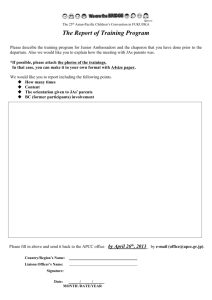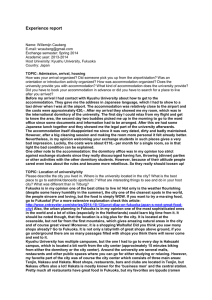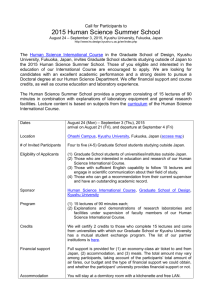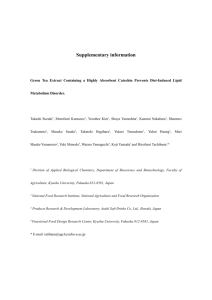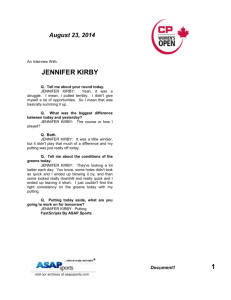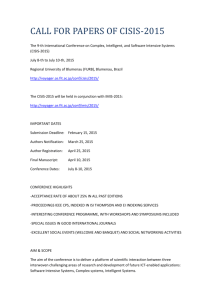You can some of this information here, in Word format
advertisement
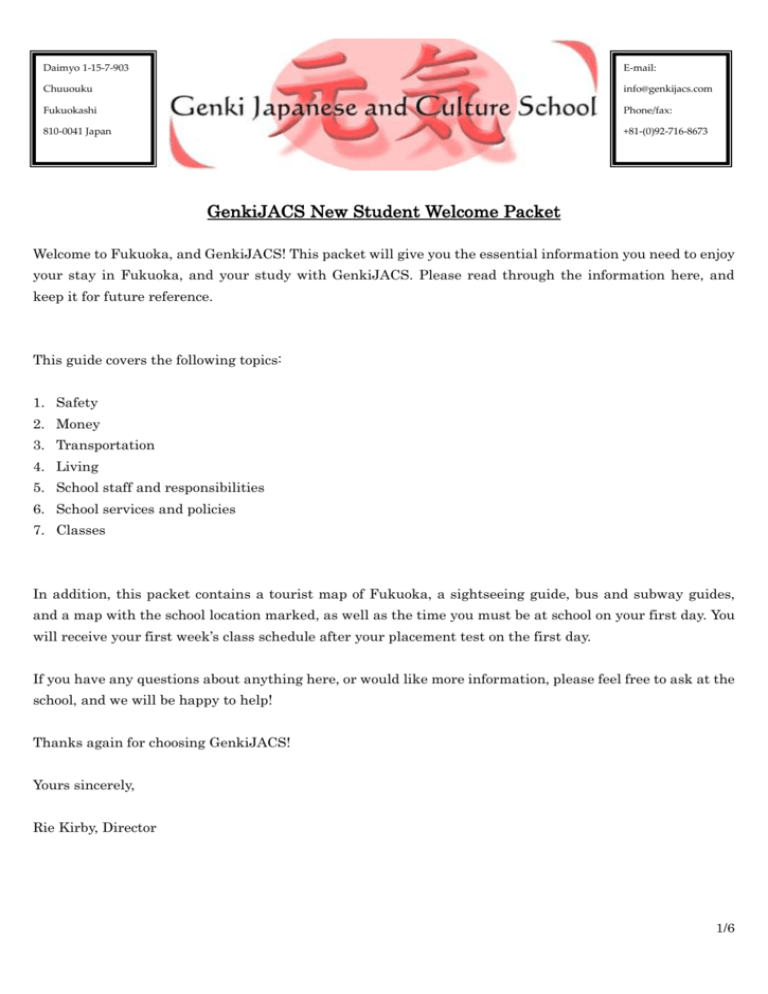
Daimyo 1-15-7-903 E-mail: Chuuouku info@genkijacs.com Fukuokashi Phone/fax: 810-0041 Japan +81-(0)92-716-8673 GenkiJACS New Student Welcome Packet Welcome to Fukuoka, and GenkiJACS! This packet will give you the essential information you need to enjoy your stay in Fukuoka, and your study with GenkiJACS. Please read through the information here, and keep it for future reference. This guide covers the following topics: 1. Safety 2. Money 3. Transportation 4. Living 5. School staff and responsibilities 6. School services and policies 7. Classes In addition, this packet contains a tourist map of Fukuoka, a sightseeing guide, bus and subway guides, and a map with the school location marked, as well as the time you must be at school on your first day. You will receive your first week’s class schedule after your placement test on the first day. If you have any questions about anything here, or would like more information, please feel free to ask at the school, and we will be happy to help! Thanks again for choosing GenkiJACS! Yours sincerely, Rie Kirby, Director 1/6 1. Safety While Japan is one of the safest countries in the world, it always pays to be careful! Emergency Phone Numbers GenkiJACS school number (092) 716-8673 GenkiJACS emergency numbers (24 hours a day) 090-4993-5365 or 090-7298-8847 Police 110 Ambulance and fire 119 English-speaking Doctors Dr. Schlemper: He speaks fluent English, Dutch and German. He practices Western medicine. Hospital: International Clinic Tojinmachi, Jigyo 1-4-6, Chuo-ku, Fukuoka. Tel 092-717-1000. Email: schlemper@internationalclinic.org. Website: www.internationalclinic.org Natural Disasters While Fukuoka is relatively safe, there is still a chance of hurricanes, typhoons and earthquakes. It is a good idea to register with your embassy or consulate. Ask your host family or accommodation manager where the nearest evacuation center (“hinan basho”) is. If an earthquake occurs, turn off all gas taps and heating devices in your home, open a door or window to secure an exit, then shelter under a doorframe, heavy table or bed. Wait until the earthquake stops before leaving your accommodation. Be aware that aftershocks can also be very powerful. Typhoons are a fairly common occurrence in Fukuoka, with up to 5 per year (usually from September through October). We will post information at the school when a typhoon is coming, as they can usually be forecast several days in advance. You should avoid going outside during a typhoon if at all possible. Dangerous Situations Women should be careful on crowded trains, as molesters are not unknown. If you are touched inappropriately, shout “Chikan” (pervert), and point to the person who touched you. Station staff are trained to deal with these situations, and they will quickly call the police. A cell phone can be your most useful tool in most emergencies. We also provide personal alarms to all female students. School Fire/Emergency The school is equipped with fire detectors and sprinklers. If you detect a fire, tell a member of staff straight away. If you hear a fire alarm, leave the building quickly and calmly, by the nearest exit. There are emergency exits at the rear of the building, if the front doors are unavailable. Follow staff directions. Do not stop to collect your belongings. After leaving the building, move away and find other students. If you cannot, go to the ground of the elementary school across the street. 2/6 2. Money Credit cards, Checks Most chain shops and department stores accept credit cards; many smaller shops do not, so make sure to carry some cash. Checks are not used in Japan, and there are very large fees to cash a check at a bank. ATMs Most bank ATMs now accept international ATM cards (VISA, MC, Cirrus, Plus, etc). Fukuoka Bank and CitiBank do at all locations, as does the Post Office, so you can use these to take out money from your overseas account. ATMs in convenience stores usually do NOT accept international ATM cards. 3. Transportation Most transportation in Fukuoka shuts down around midnight, so be careful to get back to your accommodation before then. Confirm the time of the last bus or train in advance. Fukuoka City Subway All subway trains stop at every station; there are no express trains, but there are three different lines, the Hakozaki line, Kuko (airport) line, and Nanakuma line. Easy to ride and hard to get lost, subway maps in English are located above each door. Popular stops are announced in English. And, like all trains and subways in Japan, first you purchase a ticket and then put it through the gate to get in and again to get out. Nishitetsu Bus Local buses run all over Fukuoka Prefecture. Schedules and maps at the bus stops are always in Japanese and can be confusing. If you ask, the driver is usually kind enough to notify you of your stop. Buses usually run on three different schedules: weekdays, Saturdays, and Sundays. Schedules are colour-coded and are posted at all stops. Weekdays are green; Saturdays are yellow or orange; Sundays / holidays are pink. You board the local Nishitetsu buses from the rear. As you get on, take a ticket from the machine, with a number on it. The display at the front of the bus shows the fare beside the ticket number. Highway Bus Centres Long-distance buses arrive and depart from two points in Fukuoka City: Hakata Station and Tenjin Station. Nishitetsu bus information can be found on the 3F of both the Tenjin Bus Centre and Hakata Bus Centre. Buy your ticket at the counter before boarding and get in line at your destination’s boarding point. JR Kyushu Trains Hakata Station is the major centre in Fukuoka for local as well as Shinkansen (bullet) trains into Kyushu. There is both subway and bus access from Hakata Station. Train schedules are in English at larger stations and trains are always within one minute of scheduled time, unless there is inclement weather. (Not so with the Nishitetsu buses!). “Teiki” monthly passes are available for unlimited travel between two set stops, useful if you take the same train every day. 3/6 4. Living Recycling Garbage must be divided into three types. There are special bags for each type, available from convenience stores and colored differently, as follows: 1. Plastic bottles and glass bottles: orange bag 2. Non-burnables (metal, polystyrene, etc.): blue bag 3. Burnables (everything else): red bag Cell Phones For long stays, we recommend buying your own phone. Prepaid cell phones are available from convenience stores (in particular 7-11), and Softbank Mobile. You will need to show ID (for example, passport) to complete the contract, and minors cannot buy them. We also rent cell phones from the school cheaply, with no complex contract required. You can also rent cell phones cheaply over the Internet from G-Call, and pay by credit card. Please see this page for more information: http://genkijacs.com/cellphone.htm Tourist Information Rainbow Plaza is a great source of tourist information. It is on the 8th floor of the IMS building in downtown Tenjin. They offer information about all tourist attractions, as well as a noticeboard that you can use to find Japanese friends. Fukuoka Now (free English-language magazine and website, http://www.fukuoka-now) has event information, as well as lots of lifestyle info and a message board to help you meet people. The latest edition of Fukuoka Now should be included in this Welcome Packet. Kokusai Hiroba also provides information to foreigners. They are located on the 3rd floor of the beautiful ACROS building in Tenjin. They are open from 10am to 6.30pm and closed Mondays. The Fukuoka Welcome Card, available from Rainbow Plaza and other places, has info and discounts for many attractions. Pick it up before you start sightseeing! 5. School staff and responsibilities If you have a question or problem, talk to the relevant person below: Topic Main staff Secondary staff Accommodation questions Ayako Brady Yuuki Matsuguma Beginner 1 classes or scheduling Tomoe Yoshiguchi Machiko Oyama Beginner 2 classes or scheduling Aiko Kuroiwa Machiko Oyama Intermediate classes or scheduling Machiko Oyama Aiko Kuroiwa Course change requests (including adding or dropping classes) Ayako Brady Yuuki Matsuguma Event/tourist information, counseling Ayako Brady Yuuki Matsuguma Email addresses GenkiJACS: info@genkijacs.com Tomoe Yoshiguchi: tomoe@genkijacs.com Aiko Kuroiwa: aiko@genkijacs.com Ayako Brady: ayako@genkijacs.com Machiko Oyama: machiko@genkijacs.com Yuuki Matsuguma: office@genkijacs.com You will learn the names of your teachers in your lessons, but check out the profiles in the hallway. 4/6 To report a problem or concern that you don’t feel you can talk to any of the staff members above about, you can send an email (either anonymously or otherwise) to Evan Kirby at evan@genkijacs.com or Rie Kirby at rie@genkijacs.com. To resolve a problem or make a complaint, please use the procedure below: Teaching 1. Please discuss your problem directly with your teacher first. 2. If your problem continues, talk to the teacher in charge of your level. 3. If your complaint has still not been resolved, please contact either Evan Kirby or Rie Kirby. Accommodation 1. Please discuss your problem directly with your host family or sharemates first. 2. If your problem continues, talk to the accommodation coordinator. 3. If your complaint has still not been resolved, please feel free to contact either Evan Kirby or Rie Kirby. 6. School services and policies School Opening Hours The school is open from 9am to 6:30pm, Monday to Friday. Please note that for security reasons, if only one teacher or staff member is left in the school (e.g., in the evening), students will be required to leave. Internet Access Computers and broadband access are provided for student use, and wireless access is free if you have your own laptop. There are also many Internet cafes around the city that offer cheap access. Course changes/extensions If you decide you would like to stay for longer than originally booked, would like to study a different course from the one you signed up for, or want to take extra classes, we will try as hard as possible to accommodate your new plans. However, we require at least one week’s notice for any changes. So, if you request to add classes on a Monday, the additional classes would start from the following Monday, at the earliest. In some cases, it may not be possible to accommodate course/schedule changes, depending on what other classes are being held at the same time. In particular, for study extensions, there is a chance that another student may be booked to move in to your accommodation, so you may be required to move. Request a form at reception. National Holidays The school is not open, and classes are not held, on national holidays. In general, the school will arrange an alternate free event on these days. If no event is held, we will refund tuition for the day. Class attendance Attendance is required at all classes. If you have good reason to be unable to attend a class, call the school at (092)716-8673 to inform the staff in advance. If you are regularly absent, or absent for a long period, you may become ineligible to receive a graduation certificate. If you are absent for more than two days, the school will attempt to contact you or your accommodation; if we cannot contact you, we will contact the police as required. Please be on time for classes. Teachers will not wait for you to arrive, so you will miss class content. If you are very late, you may be refused entry to the class. 5/6 Personal belongings GenkiJACS is open to the public. Take care with your belongings, and do not leave valuables out of your sight. If you see anything or anybody suspicious, please contact a member of staff straight away. Alcohol/cigarettes/drugs Students under 20 years of age are not legally allowed to smoke or drink in Japan. Students under 20 are required to obey these laws while in the country. Drug possession/use is quite rare, and is punished very harshly in Japan. If caught, you face months in jail (likely in solitary confinement) before your trial, then many years after that in prison, or deportation to your home country, to be imprisoned there. Do not do drugs in Japan. In addition, smoking in the school itself is prohibited. There is a smoking area just outside the entrance to the school building. 7. Classes Schedule In general, your classes each weekday are scheduled as follows: 9:30-11:20: 4-skills practice classes 12:30-14:20: grammar classes 14:30~: additional classes This schedule changes depending on the season and number of students. In addition, at Beginner 1 and Beginner 2 level, 4-skills and grammar classes are combined. Each course is taught by multiple teachers, so your teacher will change from day to day, but classes follow the preset curriculum. Every Friday, a ceremony is held for graduating students (with speeches) from 14:25 in the lounge. When No Class Group Is Available If you are the only student at your ability level, the following options are available: 1) If a class at a similar level is available, you will have two hours of private lessons per day, and two hours with the closest class. 2) If no class at a similar level is available, you will have three hours of private lessons per day. For additional lessons (Japanese Plus Conversation, Japanese Plus Pop Culture, etc.), if you are the only student at your level, you will have 3 private lessons per week. 6/6

